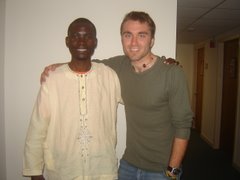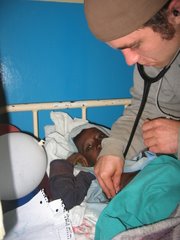 I’m home, as the heading probably tipped you off. In fact, I returned to the US two weeks ago to prepare for summer school should I not be accepted (last check put me 6th on the alternate list for medical school at Iowa) (fyi, canceled the internship in the bush as well). Being home early also let me surprise my Pops for his 80th birthday, thanks to a couple of friends who generously escorted me across the US during a week-long road trip. A bit strange to go from public transportation in Dar es Salaam, where one can be inside a van, look down and see the road between their feet, to cruising south down smooth roads through the US in a 2007 red Mustang convertible. And strange also to walk through stores and see all the products, down medicine aisles and see all the creams for any medical ailment imaginable, but each day gets progressively less shocking.
I’m home, as the heading probably tipped you off. In fact, I returned to the US two weeks ago to prepare for summer school should I not be accepted (last check put me 6th on the alternate list for medical school at Iowa) (fyi, canceled the internship in the bush as well). Being home early also let me surprise my Pops for his 80th birthday, thanks to a couple of friends who generously escorted me across the US during a week-long road trip. A bit strange to go from public transportation in Dar es Salaam, where one can be inside a van, look down and see the road between their feet, to cruising south down smooth roads through the US in a 2007 red Mustang convertible. And strange also to walk through stores and see all the products, down medicine aisles and see all the creams for any medical ailment imaginable, but each day gets progressively less shocking.The birthday surprise actually was not all that great partly because I forgot how much my dad hated surprises – and additionally because my family panicked with last minute rearrangements. And then I had an accent that through folks for a loop. They were a bit cautious at first – gauging who I was, why I spoke as I did, and trying to guess a statement this speech was supposed to make, but have since become more open to simply welcoming and accepting me. It is wearing off though, the accent, and hopefully within a few weeks will no longer be a source of confusion for me or them, or random employees in check out lines at grocery stores.
In the mean time, I’m still plugging away trying to make sense of all I have experienced. In particular of late, I think a lot about the bus trip from Dar to Arusha and back. Each way was 9 hours, and at each town through which the bus passed, slews of people of all ages crowded along the sides hoping to sell food stuffs and small items for next to nothing prices. Women arduously carried big buckets of tomatoes, and from an elevated position within the bus, anyone could look below and have their pick. Taller men simply locked their elbows and held heavy barrels above their heads. Kids bore wooden sticks with nails protruding from the top on which they pierced cobs of cooked maize. They steadily held their sticks at window level while competing for proximity on the ground with the older, stronger sellers. One little boy raised three pieces of burnt corn, and that was his living – that dusty old town, lifting what Americans use as cow feed to passerby’s day in, day out. I bought a piece of corn from him for 8 cents, the asking price, and picked the kernels off one by one. I ate it in silence, looking out the window, taking what I saw and holding it against where I’d soon be. My fingers were sore when the corn ran out. I looked down and found blisters where I had been plucking kernels. That was the one of the most subtle but obvious signs of my wealth and therefore privilege and fortune – the food that kid eats every day gave me blisters.
There are other people I think about too, like the boys outside my house who played soccer in the street. Most played barefoot, but some shared a pair of shoes so that one had a left shoe on his left foot and another had the right on his right. How could it be I have accumulated so many shoes back home that I have my own storage box in the basement for the ones I don’t use that often?
As is usually the case when traveling, I brought my fair share of junk that I never used; before returning home I gave a lot of my stuff away. When I tossed chap stick to my friend, she studied it carefully then asked what it was. “Oh,” I said, “it’s, uh, chap stick. You know, we put it on our lips to make them soft when they feel dry. Want it?”
She wrinkled her brow and furled up her nose. Slightly puzzled and still unsure of what this thing was, "sure," came her reply. Her voice, however, belied the honest answer, which was, “no, not really, but because it’s a gift, thanks”. I felt silly with this special wax tube, and never realized how luxurious chap stick was until I tried to explain its use to a Tanzanian.
This journey continually forces me to confront difficult questions about life, humanity, purpose, myself, what is right and wrong, and where the criteria for this dichotomy is derived. It challenges me to grapple not just the difference between good and evil, but also the differences between good and right, good and helpful, and good and productive. What is the value of sincere generosity if it is naïve, not having assessed or fully understood the context in which it is being received? Can a doctor who devotes his life to underserved, underprivileged, people groups, rightfully eliciting respect and admiration for his or her noble character, contribute good to the world through his or her intentions and yet leave having not actually helped the people he or she served? Can you alleviate pain in a manner that allows you to feel good about your contribution and yet in a way that fails to bring your patients and their subsequent generations any closer to a sustainable escape from the trap of poverty? These are all open questions, but ones whose answers bear heavily on the future I pursue.
Post-note insert: Here's a clip from a recent email that balances the last paragraph, which I appreciated, and which is a good reminder to anyone regardless of where their passions lay -
"If your return to Africa is dependent upon convincing yourself that it will be worth it, you may never go back. Millions, and I mean millions, of people have tried to fix Africa in one way or another. In some respect, you are fighting a forest fire with a garden hose. But that doesn't mean that you can't try, or that you shouldn't try.
It's the trying that has to be worth it. It's the journey, not the destination. Because if it was the destination then we would all be terribly depressed at the fact that we will end up 6 ft under (baring the afterlife, of course). But we don't just hole up and wait to die, because the journey is worth it.
Your contribution to this world is done. It's a forgone conclusion. It doesn't depend on what you do from here on out, but rather who you are from here on out (which doesn't seem to significantly change). This trip, as I see it, is a symptom of your condition. Your wonderful human condition that will spark progress regardless to what you devote your life. The difference between going to Africa and making an impact and going to Topeka, Kansas and making a difference is a mere formality. You will make unfathomable impacts that cannot be weighed or compared lest you spoil God's curriculum.
When your brain, your heart, and your passion all point in the same direction, you've hit the trifecta. Be sure to run with it."
On a lighter note, I will miss 10-cent avocados, 8-cent tortillas, and 4-cent savory bread rolls.
As for the final take on missions work - gosh, I believe there is freedom in the church, but I've seen it so twisted that I don't know whether or not I could be a bonafide career missionary. At the moment I'd like to return and work as a doctor, hold my own Christian faith (not sent by a mission agency) and let the interactions I have with others and the respect/love I give them be the catalyst for personal change. Maybe in treating people with dignity, those interactions 2000 years down the road will manifest themselves into positive change and a different world.
Before leaving, I picked up The Shackled Continent by Robert Guest, a journalist for the magazine The Economist. In his book he tries to answer why Africa is so screwed up, addressing its past, present and future. It’s brilliant writing and I highly recommend it to anyone wanting to understand African politics. But I bring it up because he closes with these paragraphs that resonated with me:
“I will always be an outsider in Africa. I have never been poor or oppressed, and I grew up in a country where African-style poverty has been unknown for generations. When I wander around Africa, I do so wrapped in the armour that money provides. Where there is violence, I can afford to stay in a hotel with security guards. Where there is sickness, I can buy medicine. Where there is hunger, I can always find something to eat.
“Africa constantly reminds me how lucky I am to have grown up in a rich, peaceful country. If I’d been born in Africa, there’s a good chance that I’d be dead by now, and almost no chance that I’d be racking up so many frequent-flyer miles. I’m a foreigner, so this is an outsider’s perspective, for what it is worth.” – Robert Guest, The Shackled Continent
 And so that’s it, the end of the blog. Thanks for reading. And thank you to the ones who have supported me financially and emotionally, and for those of you who prayed throughout these months. I have learned a lot and hope that through this weblog you have also picked up more about these parts of the world and the thoughts, challenges and lessons they hold.
And so that’s it, the end of the blog. Thanks for reading. And thank you to the ones who have supported me financially and emotionally, and for those of you who prayed throughout these months. I have learned a lot and hope that through this weblog you have also picked up more about these parts of the world and the thoughts, challenges and lessons they hold.Thank you and sincerely,
Benjamin Huntley, Sojourner, Friend



3 comments:
Ben, I have enjoyed reading your blog immensely. I took a break and came back to it today--and it was very interesting to read about your experiences (both good and bad) in Tanzania.
I hope you are able to attend medical school this year at Iowa, and that you continue to want to return to Africa when your training is finished.
I have never really had a desire to visit Africa, but some of the stories you have told make me think I should consider it.
--Chiara Hemsley
(your former biology TA, in case you don't remember me!)
今年のクリスマスも後少しですね。グリー内でもクリスマスに備えて異性と交流を持つコミュニティが活発で、自分も今年のクリスマスにお陰で間に合いました!!みなさんもイブを一人で過ごさなくても良いように、グリーで異性をGETしよう
最低時給1万円!?誰も知らない驚愕の副収入・・・会員登録すれば今すぐにでも開始できます!!今月ピンチな方・お金を稼ぎたい方はココで稼いで下さい
Post a Comment